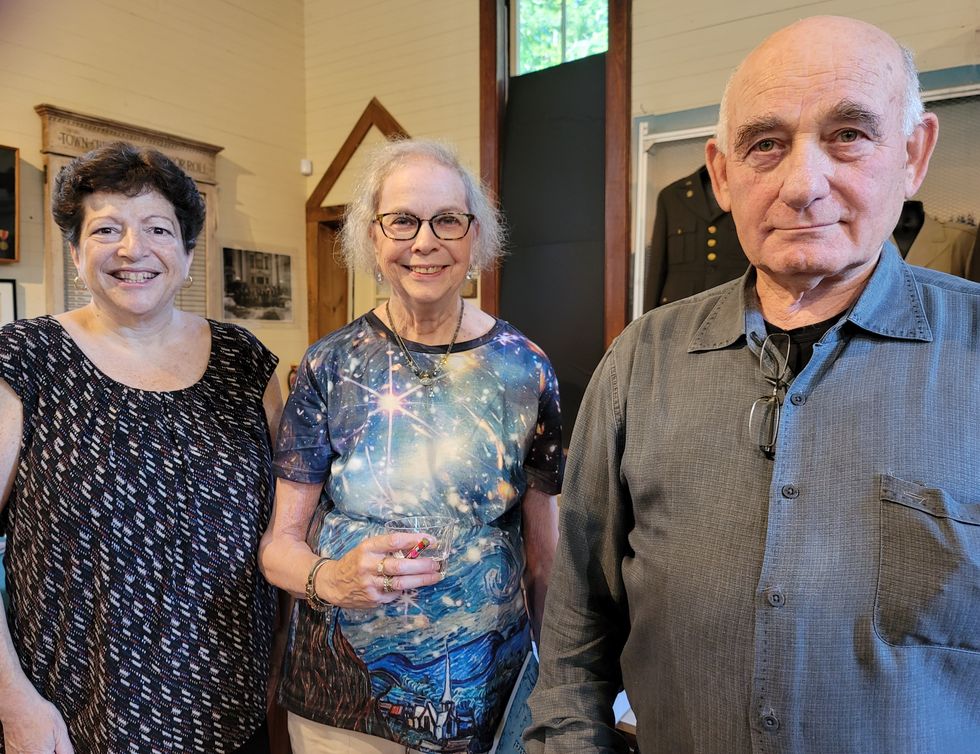COPAKE — With the news media reporting a recent rise in anti-Semitism around the world, a program about the Holocaust presented by the Roeliff Jansen Historical Society (RJHS) on Sunday, Aug. 28, hit close to home. Three presenters shared the personal accounts of their families during the Holocaust.
The talk, entitled Three Perspectives on the Holocaust, was poignant; it recalled the atrocities of World War II. It coincided with an exhibit currently on display at the RJHS’s headquarters in Copake, and gave the audience a peek into the Nazi regime and the free world’s fight to end it.
Two authors shared their published stories, as did a presenter who was a child of a Holocaust survivor. She, too, spoke of her mother’s experiences, which were recorded in a diary, and of her uncle’s experiences, which were recorded in a book he wrote.
Sharon Flitterman King wrote an historical novel entitled “A Secret Star,” published in 2010. It’s the story of a Jewish child who was hidden by a Christian Polish family during World War II. It tells of how the young girl, Rachel, learned to be resourceful and strong while being nurtured by strangers.
Flitterman King has written extensively for well-known journals and magazines, including The Christian Science Monitor, The Independent and The Artful Mind. She’s also a much sought-after lecturer.
With her husband, David C. King, she’s co-authored several award-winning books, including “The Statue of Liberty” and “A Reader’s Guide to ‘Night’ by Elie Wiesel.” The Hillsdale resident is also a founding faculty member of the Bard Institute for Writing and Thinking.
Joseph Gosler’s warmth and humor were evident, as was his skill of being a good storyteller. His story, though, was serious and sad, and spoke of the courage and survival skills of a young child.
That “hidden child” in Gosler’s book found himself in the Netherlands during the Holocaust, after being given by his Jewish parents to a nursing student to be kept safe from the Nazis. The student, a member of the Dutch resistance, in turn placed the boy with a Christian family.
There he remained from the age of 7 months to the age of 3, when he was finally reunited with his birth parents. In Gosler’s book, the child was confused and scared, as he didn’t recall his birth parents and simply wanted to return to the family that raised him.
Brought up as Pietjke Diijkstra, the boy did not even know his given name, Josie Gosler. The book addresses how he was impacted by the traumatic events of his youth.
Gosler, an Ancramdale resident, said at the presentation that “childhood wounds never fully heal.”
He shared with the audience on Aug. 28 what it was like living through World War II and how it was to move from that time into the late 20th century. The personal memoir of his experiences as a hidden Jew during the Holocaust and then as a Jewish immigrant in the United States shares his struggle to cope personally, and as a caring son.
His parents, he said, were “emotionally gutted from their own wartime experiences [and were] barely able to care for themselves, let alone this young stranger.”
Gosler will again share his tale at the Roeliff Jansen Community Library on Wednesday, Sept. 14.
Barbara Steinberger, a longtime Hillsdale resident, also spoke of her family, focusing on her mother, Erica Steinberger. Her mother grew up as Erika Löbl, a teenager living in Bamberg, Germany, when Kristalinacht occurred. Erika, 14, and her brother, Werner, 13, were sent by their parents to the United Kingdom in 1939 for safekeeping.
After some harrowing experiences of children and parents, the family was reunited in Ecuador. They resided there until the war ended.
All the while, Erika preserved her diaries, which told the story of the family’s survival from 1937 to 1945.
In 2002, after her parents, Ralph and Erica, both died, Steinberger and her Uncle Werner discovered her mother’s diaries. There were two diaries, handwritten in old German rather than the German used today. The diaries had to be translated.
Steinberger’s book was printed in German. The city of Bamberg published the diaries to teach German students about the Holocaust. She said it helps younger generations learn what it was like to live through that tragic period, through the eyes of a teenager about their own age. The city of Bamberg considers the book it’s own local version of “The Diary of a Young Girl,” by Anne Frank, she added.
Steinberger’s uncle, Werner Loval (Löbl), also published a book in 2010 about the Holocaust. It’s entitled, “We Were Europeans.”
An autobiography, it begins the story from when he was 7 and follows him throughout his life.
Although those Jews who survived emigrated to different parts of the world, Loval’s book hits home the point that they were all Europeans.
After his family arrived in the U.S., Loval eventually resettled in Israel, where he remains. Steinberger plans to travel to Israel this month to help him celebrate his 96th birthday.
Steinberger, who is today the internal communications writer for Yale’s School of Medicine in New Haven, Conn., noted she’s proud of her family, her mother and her heritage. She’s also thankful her mother’s precious diaries were kept safe so her story could be shared, and remind people of that terrible time in history.
Like the other two at the presentation, as well as Jews around the world, Steinberger said her goal is to make sure people never forget the Holocaust — in order to make sure history never repeats itself.









 Penguin Random House
Penguin Random House
 A needlework example.Cynthia Hochswender
A needlework example.Cynthia Hochswender Alexandra Peters, left, is exhibiting needlework samplers from her collection at the Litchfield Historical Society Museum.Cynthia Hochswender
Alexandra Peters, left, is exhibiting needlework samplers from her collection at the Litchfield Historical Society Museum.Cynthia Hochswender




